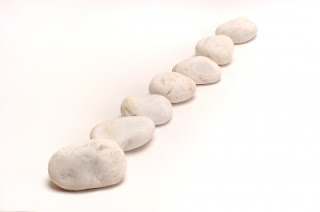Have you ever done a load of dishes in the dishwasher only to have them come out spotty and with bits of food still on them after using your favorite dishwasher detergent? Or have you done a load of laundry only to discover that your items just were not as clean as they need to be? It's not a problem with your dishwasher or your washing machine. It's also not a problem with your favorite dishwasher soap or laundry detergent... well, not technically.
In 2010, a ban went into effect prohibiting the use of phosphates in dishwasher detergent. It began in 17 states. The phosphates were getting into the water supply and causing the growth of algae, so they were banned. (Link HERE.)However, because of the expense associated with trying to manufacture one type of detergent for some states and a different type of detergent for other states, the manufacturers made the decision to just make one type of dish detergent: phosphate free. Phosphates were removed from laundry detergents in 1993.
It's a win for the environment, but it's a loss for trying to get your dishes and laundry clean. Trisodium phosphate is a degreaser, soap scum buster, and left sparkling clean dishes and fresh laundry. Unfortunately, once that was removed from these soaps, things were not good. Pans came out dingy, aluminum turned black, fingerprints and lipstick were still present on dishes and glasses. Some laundry soaps left clothes looking like they'd not even been washed. Water could have done as good a job. What's worse, if you live in an area of the country that has hard water, your dishes may have begun showing a filmy, milky, powdery residue, and your whites may have begun to be dingy.
What can a person do? Short of adding trisodium phosphate to these soaps, there are other options for combating these problems. They are additives that can combat the minerals, metals, and other compounds found in water, allowing the detergents and soaps to do their jobs. Here are some of them.
Citric Acid -Citric acid is what makes lemon juice tart. It has many uses not only in cleaning but in food and food preservation. For cleaning, it serves as a chelating agent, binding to minerals and especially metals in hard water. It makes an excellent additive to both the washing machine and the dishwasher. It is the main active ingredients in dishwasher rinse aids such as LemiShine (If you want to read a fun chemist's breakdown of LemiShine, read the link HERE.) Add 1-2 tablespoons to laundry to help laundry get cleaner, or add 1-2 teaspoons to your dishwasher for crystal clear glassware and spot-free dishes. You don't have to buy LemiShine. Instead, you can buy straight citric acid from places like Amazon.com, or find it in the canning aisle of your favorite grocery store, although buying it that way is quite expensive. You can also buy it in bulk from Soap.com.
Lemon Juice - Nature's own citric acid. (See note above.) Add 1/4 cup to your laundry or dishwasher.
White Vinegar - Acetic acid in water. This is an excellent mild acid that dissolves calcium and makes it water soluble. It is excellent for adding to laundry to increase the water's acidity. It breaks down minerals contained with hard water, and it also helps to dissolve any residual soap scum left from laundry. It is an excellent substitute for a fabric softener by adding it to the final rinse of a load of laundry. Use anywhere from 1/2 to 1 full cup. It is also a wonderful substitute for spotfree treatments in your dishwasher. Just fill the rinse compartment with white vinegar and use as you normally would the rinse solution.
Washing Soda - Sodium carbonate or soda ash. Not to be confused with baking soda, which is sodium bicarbonate.
Sodium carbonate bonds with magnesium and calcium ions in hard water
and prevents them from bonding with detergent. This allows the
detergent to do its job and for your clothing to get cleaner. It also
raises the pH of water. If you're a pool owner, you are familiar with
The pH Plus product sold in stores to raise the pH. Raising the pH also
allows detergents to clean better. (Link HERE.) Add approximately 1/4 to 1/2 cup to your laundry to help soften water and achieve better detergent results.
Borax - Sodium borate, sodium tetraborate, or disodium tetraborate. Prevents calcium and magnesium from binding with detergent and rendering it ineffective. (Link HERE.) However, unless you use hot water, borax can be difficult to dissolve and can leave powdery granules in your washing machine, so it may not be your first choice to use if you have hard water.
















No comments:
Post a Comment